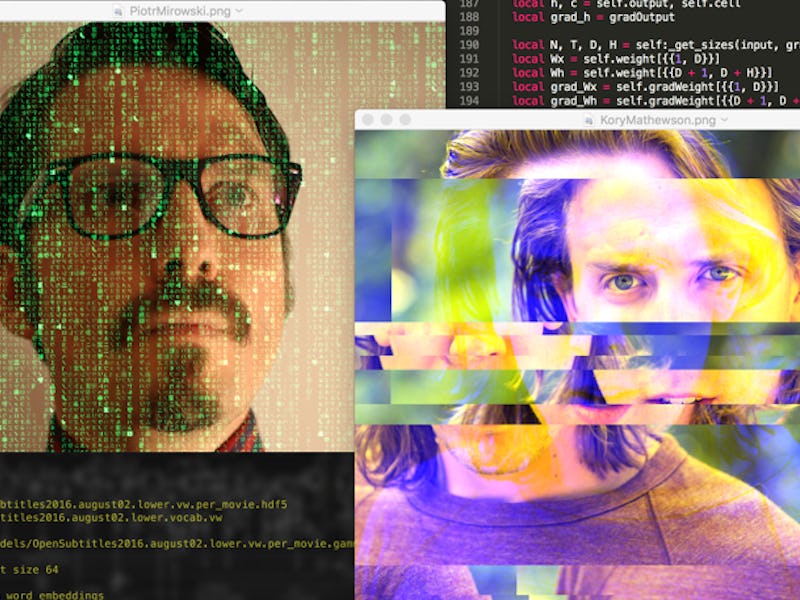This A.I. Is Learning How to be Human by Doing Improv Comedy
And you thought Siri could crack jokes.

As countless mildly disappointed parents will be happy to tell you, nobody was born to do improv comedy. Well, nobody human.
The A.I. chatbot A.L.Ex — short for Artificial Language Experiment — has been built and painstakingly trained to be the best possible scene partner when improvising with a human. Its creators are researchers Kory Mathewson of the University of Alberta and the London-based Piotr Mirowski, who studied deep learning at New York University. The pair see improv as the perfect collaborative art form — one where the point isn’t just to entertain the audience but to make one’s partner look as good as possible — to see how humans and A.I. can work together.
“We do not think that machines will replace human actors or comedians,” Mathewson tells Inverse in a Twitter message. “We aim to build new tools and techniques for human storytellers to share their human experience. This work aims to test the development of a new form of medium.”
The researchers presented some of their latest work with A.L.Ex at October’s AAAI Conference on Artificial Intelligence and Interactive Digital Entertainment. Available as a preprint on arXiv, their paper tested whether A.L.Ex could pass the improv comedy equivalent of the Turing test, as audiences were asked to tell when the A.I. was improvising and when it was actually being controlled by a human.
Piotr Mirowski (left) holding A.L.Ex and Kory Mathewson (right) holding another robot.
A.L.Ex is powered by a neural network, a computer system that mimics the human brain. The rsearchers trained it on subtitles from 100,000 films to make it able to stitch together jokes on the fly during their performances. They even gave it a human voice and a physical body, that sort of looks like a Nao robot, so they can run around with it on stage and do everything they can to make A.L.Ex look like a natural.
“The performers strove to endow the AI with human qualities of character/personality, relationship, status, emotion, perspective, and intelligence, according to common rules of improvisation,” they explain in their paper. “The system we developed aims to maintain the illusion of intelligent dialogue. Improvised scenes developed emotional connections between imaginary characters played by humans and AI improvisors. The human-like characterization elicited attachment for the AI from audience members.”
Like any good improv scene, the audience determines how things get started by naming a place or a topic to inspire the scene. The performer — usually Mirowski — then freestyles a couple of lines of dialogue to get A.L.Ex warmed up. From there Mirowski and A.L.Ex go back and forth on stage until the scene comes to a natural end or reaches peak funniness.
The Turing tests involved tricking the audience into believing that the robot was performing for one scene — a human offstage was actually controlling his responses — and letting A.L.Ex take the wheel for the next to see if they could spot the difference. In the first performance, the audience knew ahead of time they would be asked to spot the difference, while in the second the audience was only asked after watching both performances that one of them wasn’t actually A.I.
Turns out A.L.Ex isn’t quite ready to pass the Turing test — pretty much everyone could tell the difference between human and A.I.
Of course, that didn’t rule out that A.L.Ex could be a gifted improviser. In the second performance, roughly half of the audience said the A.I. perfectly complemented the human performance, its inhumanity notwithstanding. There’s plenty of human improvisers you can’t say that about.
While this paper has not yet undergone peer review, it shines a light on a different facet of artificial intelligence rarely looked at in mainstream research. A lot of research in this field is centered on the idea that A.I. can be used to replace humans, while this focuses on a more collaborative effort grounded in performance art.
But then, who knows? With the proliferation of chatbots, if A.L.Ex ever has his breakout performance, even improv comedy won’t be safe from automation. Mildly disappointedly parents everywhere will surely be thrilled.